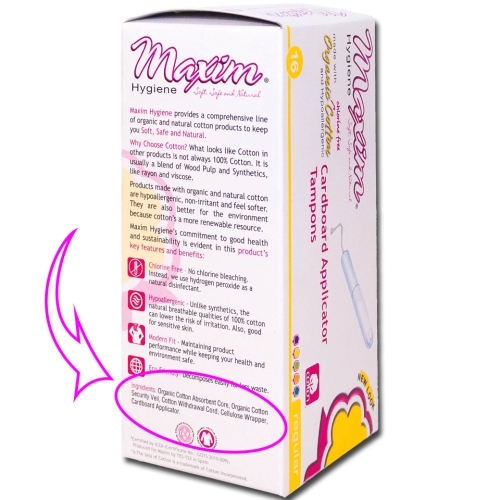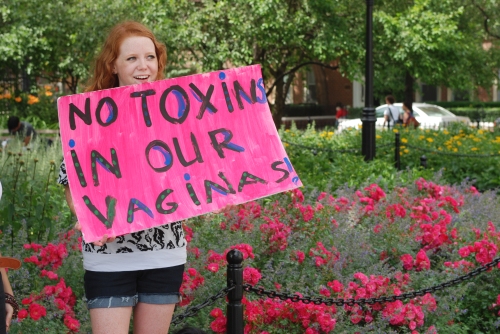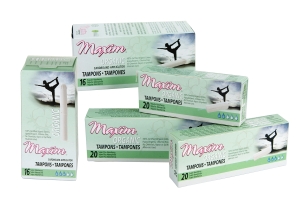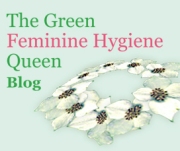With only 20% of the U.S. Congress being comprised of women, every female vote is fiercely necessary in order to better represent the needs of the female population. Congresswoman Carolyn Maloney (D-NY) is our hometown state’s first and current woman to represent New York City’s 12th Congressional district (she was also the first woman to give birth while in office).
Since she was first elected to Congress over thirteen years ago, Congresswoman Maloney has created positive change in many different sectors of government. We are most in awe of her nationally-recognized advocacy for women’s issues, one in particular which we are watching very closely – The Robin Danielson Feminine Hygiene Product Safety Act, a bill named after a woman who died from Toxic Shock Syndrome as a result of using a conventional tampon brand. Maloney has tried to pass the legislation in Congress some nine times, re-introducing it again just last month, in a year that has seen a huge consciousness shift around period acceptance and awareness of environmental toxins.
The act asks that there be independent testing on all feminine hygiene products – from tampons to douches – by the National Institutes of Health that investigates the safety of the chemicals and synthetic fibers used by many femcare companies. These findings would then be made public, as would all ingredients – listed on the side of the box, a practice we at Maxim Hygiene products already implement as seen on this pack of our organic chlorine free cotton tampons.
Although there is some research out there already on the topic, like the widely distributed Chem Fatale Report, there is still cause and demand for more. As a company who is committed to women’s health, we are inspired by Carolyn Maloney’s allegiance to this issue, which is why we’ve elected her as May’s Fierce Woman of the Month.
We had the great privilege of connecting with Congresswoman Carolyn Maloney about her dedication to the cause in this exclusive Q&A.
What inspired you to create the Robin Danielson Act originally?
I first introduced Robin Danielson legislation in 1999 to create a program to conduct the collection and analysis of data on Toxic Shock Syndrome (TSS), a bacterial infection considered rare but more prevalent in the 80s and 90s, and linked to high-absorbency tampon use. The bill was named after Robin Danielson, a woman and mother who tragically died from Toxic Shock Syndrome in 1998 at the age of 44. I remember being shocked at how little data is being collected and analyzed on a product used so frequently by women throughout the course of her life. If tampons have the potential to be life threatening or cause some other adverse health effects we must do something about this for women everywhere.
Over time, greater awareness about the environment has led to more concern about the chemicals and other contaminants being absorbed in women’s bodies, which is why an updated version of the Robin Danielson Act in 2014 called for new research by the National Institutes of Health (NIH) on additives in all feminine hygiene products. I reintroduced the bill again recently with the new name the Robin Danielson Feminine Hygiene Product Safety Act of 2015.
Why do you feel it is taking so long for this legislation to go to vote in Congress?
In Congress things take time, in part because it often takes strong bipartisan support to get anything done. A further factor in passing this bill is that women’s health and feminine hygiene are unfortunately not something members of Congress are comfortable discussing. I continue to reintroduce this legislation, because it helps move the conversation forward.
Do you think it is fair to make comparisons with the way the FDA and government has responded to the problematic ingredients of toothpaste, as RH Reality Check recently did?
The FDA is looking at triclosan, and many companies have removed it from toothpaste, but it is important to recognize that this chemical, which is an endocrine disruptor, is included in many feminine hygiene products. My legislation would require the FDA to consider the health impacts of all the chemicals and contaminants in these products as well.
Do you think the taboo around menstruation is partly to blame for lack of progress in research into these products?
Menstrual health has long been considered a taboo subject and something that is often overlooked and brushed aside. This bill helps begin a conversation to encourage research and ensure that women live healthy lives.
What can women do to help you and support you in enacting this legislation?
The best way to generate greater support for the bill is for individuals to call or write their representatives in Congress and ask them to support the bill. It’s great to raise awareness through word of mouth, and also through social media. Interested women can be advocates by sharing articles and information through their social media networks.
At Maxim Hygiene, we define a Fierce Woman as a “glorious female creature whose idea of beauty is hinged upon the idea that she can change the world with each choice, each moment and each breath of her life.” Who in your life is a Fierce Woman and why?
There are many fierce women in my life but I’m particularly inspired by women in political office who’ve taken charge and are leaders on issues that have gone unnoticed. That’s why we need more women political leaders so that a full range of perspectives can be addressed. I hope all women can become fierce and see how she can change the world through each action.
So, if you’re feeling as inspired as we are about this Fierce Woman, flex your feminine voting powers by calling or emailing your Congressperson and telling them you need them to support this bill. Don’t know who your Congressperson is? Click here where the fine ladies and our friends at Women’s Voices for the Earth have a nifty Congressperson locator tool.






